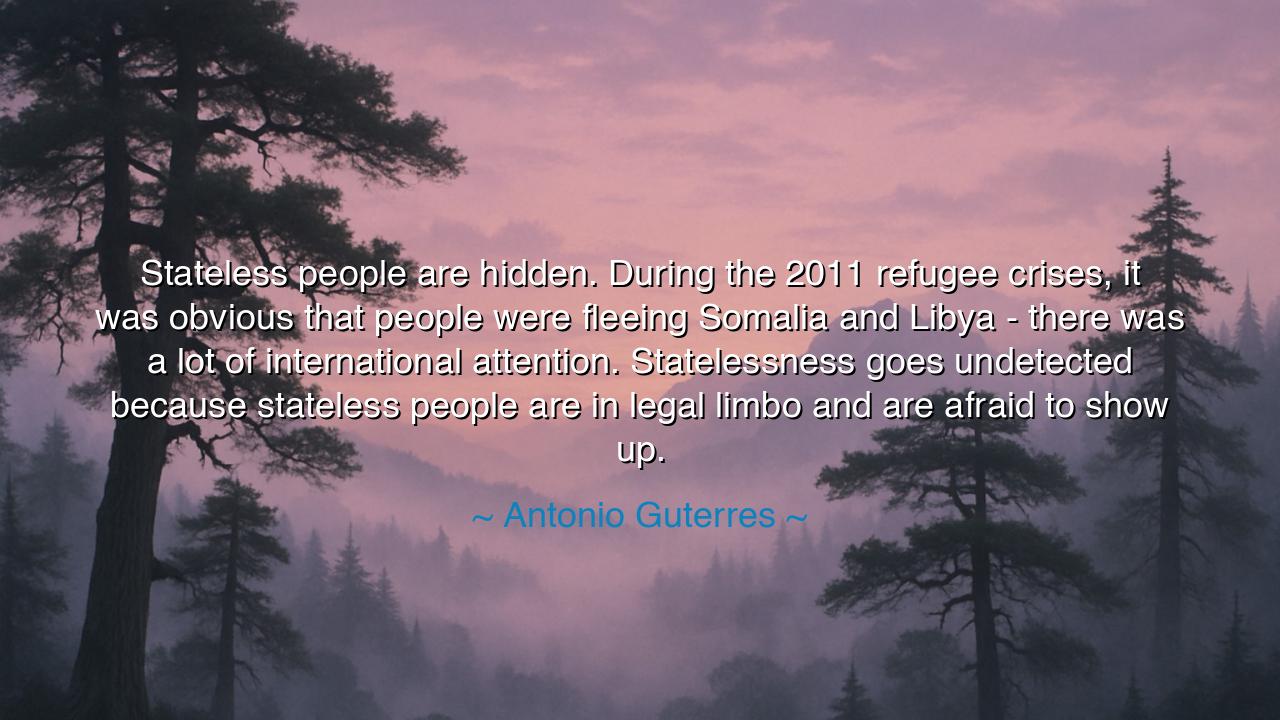
Stateless people are hidden. During the 2011 refugee crises, it
Stateless people are hidden. During the 2011 refugee crises, it was obvious that people were fleeing Somalia and Libya - there was a lot of international attention. Statelessness goes undetected because stateless people are in legal limbo and are afraid to show up.






Hear the solemn words of Antonio Guterres, shepherd of the world’s displaced, who declared: “Stateless people are hidden. During the 2011 refugee crises, it was obvious that people were fleeing Somalia and Libya—there was a lot of international attention. Statelessness goes undetected because stateless people are in legal limbo and are afraid to show up.” This utterance is heavy with sorrow, for it speaks of those who, though alive, are unseen; though human, are unnamed; though breathing, are as shadows passing through the world without recognition.
The refugee is visible—he flees across borders, he gathers at camps, his plight draws cameras and aid. The world sees his suffering because his flight is marked by movement and by noise. But the stateless, as Guterres reveals, are cloaked in silence. They belong nowhere, claimed by no nation, bound by no law that protects. They are the invisible multitudes, dwelling in a legal limbo, fearing discovery because discovery might mean expulsion, imprisonment, or exploitation. Their condition is more subtle, yet more cruel, for to lack a country is to lack not only safety but identity itself.
Consider the Rohingya of Myanmar, stripped of their citizenship by decree, turned into strangers in their own ancestral land. For decades they endured as stateless people, invisible to the world until violence forced them to flee. Only then did the world take notice, yet even in exile many remain in the shadows, unrecognized, without papers, without a name in the eyes of the law. Their children are born into the same silence, as though the very earth itself refuses to write their existence into the book of nations.
History, too, bears witness to this affliction. After the fall of empires, millions wandered Europe without passports, without the blessing of belonging. They were called “displaced,” yet many were more than that—they were stateless, caught between nations that claimed them not. The jurist Hannah Arendt, herself once without a country, wrote that to be stateless is to be stripped of “the right to have rights.” This is the wound of which Guterres speaks: not merely hunger or flight, but the slow erasure of dignity.
Yet within his words lies also a call to vigilance. He warns that the hidden must not remain hidden. For what is unseen is too easily ignored, and what is ignored festers into injustice. When the eyes of the world turned to Somalia and Libya in 2011, aid was sent, camps were built, and debates were held. But the stateless, afraid to step into the light, remained beyond even the reach of compassion. Their silence becomes their prison, and the indifference of nations becomes their chain.
What, then, must you learn from this truth? It is this: open your eyes not only to the visible cries of the suffering, but also to the whispers of those who cannot speak. Do not be content with the dramas of the news, but search out the hidden, the uncounted, the ones who exist only in the shadows. Justice is not only for those who are loud, but also for those who are silenced by fear.
And in your own life, act with courage and compassion. Support those who fight for the recognition of the stateless, who seek to give them names, documents, and rights. Raise your voice where theirs is muted. Remember always that belonging to a nation is not a privilege but a foundation of human dignity. To defend the stateless is to defend humanity itself, for today it may be them, but tomorrow it may be you or your children if justice falters.
So let Guterres’s words be engraved upon your heart: stateless people are hidden, yet it is the duty of the just to make them seen. For the true greatness of a nation, and of a people, lies not in the strength of its borders, but in the compassion with which it embraces the forgotten and restores to them the right to have rights.






AAdministratorAdministrator
Welcome, honored guests. Please leave a comment, we will respond soon